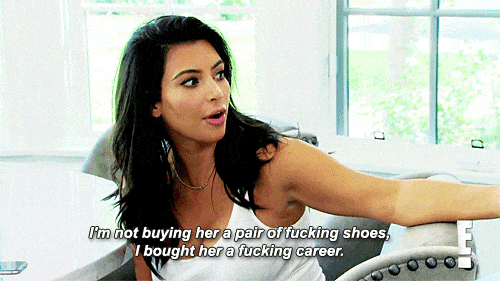Intent on making 2018 your Best Year Ever? We can help with that, thanks to our Coach of the Month series. This January, Ellevest CEO Sallie Krawcheck will upgrade your financial health, teaching you how to make more money — and make the most of the money you have. If you've been waiting to make a career leap, wait no more. Krawcheck will help you navigate a job pivot with ease.
Which one of these women is you? I've been both: Perhaps you... went to school for a particular field, worked in it for a few years without it lighting a fire in your belly, and are now sure it's not for you?
Or maybe you started a career in a field you love, have done well, climbed the ranks, achieved a certain status, changed companies once or twice or more, and feel pretty content.
Great! It's time for both "you's" to think about changing careers.
Fact is, whether you love your job or are ready to leave it, staying safe and cozy in a single field is its own risk today. Why? Because: reality. The pace of change in almost every field is dizzying and what were once steady fields and safe careers are being disrupted, while new businesses and even industries are being created every year.
So smart women like you need to strap on a parachute before you even need it, and be prepared to make a huge leap in your career at least once in life. So we all need to be savvy about career changes — ideally well before we ever have to make one.
Be Open to Change and Changing Yourself
Hey, have you ever heard of Kodak? Kodak was a massive camera company that made its fortune on film — before digital photography all but completely wiped out film. The kicker? An engineer at Kodak actually invented the first digital camera, but executives said "Shhhh, that will hurt our film business" and let 10 years go by before they jumped in the digital-imaging game. And? Kodak went bankrupt in 2013.
Don't be Kodak. Don't hold onto a single idea about what you do — "I'm an events marketing director" — and instead see yourself as a bundle of skills: promotion, marketing, working to budget and to deadline, working with large groups of clients, and so forth. And always, always be on the lookout for new skills as they enter your field — instead of letting others in your company get all that free training.
Be a Voracious Learner
Being open to change is one thing; being truly, deeply curious is another and, arguably, even more important. One of the reasons I was able to make the career changes I did — I've been a research analyst, an investment banker, the head of businesses at mega-companies, a CFO, in charge of turning around scandal-plagued businesses, turning around troubled businesses and now I'm an entrepreneur — is because I love learning.
If you steer yourself toward being curious about all that is happening at your company — ask questions at meetings, become familiar with every new piece of technology or each strategic game plan — you'll also be much more practiced at adapting to the change that any career shift entails.
Lean Into Your Broader Network: Loose Connections Lead to Jobs More Often Than Close Ones
When you realize you're ready to leap into a new career, tell everyone — and I mean everyone. Why? Because it's not your innermost, reliable network that is most likely to lead you to your next great opportunity. It's your loose connections, i.e. not the people you would invite to a dinner party, but the people you meet in passing or are introduced to along the way. The reason those loose connections are so powerful? They operate in different circles than you do and are exposed to different ideas and news happening different industries than yours, so they bring you new information.
Here's the key, though: You have to find ways to give to your loose connections — sending an article that relates to their current project, introducing an associate you think they should hire — so that they, in turn will turn around and give back to you. And keep this in mind: most of your giving will never pay off or turn into a gold mine. But you don't need all of it to, or even much of it to. You just need a couple of "wins."
When Your Connections Get You Interviews, Show How You Adapt
So you did it: You made new friends, and together you sparked brand new connections that led to interesting new career prospects. Some of them want to interview you. Great! Now put yourself in the interviewer's position: Don't just tell her you're adaptable — show her how you've adapted. Identify any shift you've mastered in your past jobs, even in your life, and use that shift to showcase not only how you manage change — but how you MASTER it.
Look for Ways to "Sample" Your Dream Field
Major career changes don't happen in a series of interviews. You might need specific training, a new degree, a year or more in clocking hours before you become certified. In these cases, don't leap before you look. Do some research, call some friends and connections, send letters, get curious, and figure out how you can get close to that kind of work, whether by shadowing someone who has the job you want or even just finding ways to get close to the people in your field. Before I became an entrepreneur, I served on a couple of advisory boards and also mentored some entrepreneurs. In both cases I helped them with my skills, but I was also gaining a front-row seat to entrepreneurialism. Not only will this exposure help confirm your interest before you commit big bucks or serious hours to a new career — it also will introduce you to people in the very field you want to be. Loose connections!
How to Get the A (or At Least the B+) and Make Sure People Know It
So you DID IT, and you're in a new field! Congratulations. Now don't mess it up by putting your head down, and just doing great work..
Stay with me here. Of course you want to do a good job. Of course you even want to do a great job. You know, deliver a great project on time, land a new client, manage that budget to the dime. But remember one thing: Work isn't school. "Getting the A" — or even the B+ — on all your projects isn't going to land you the next great, career-making project or grant you a nice, fat raise. Because the fact is, what makes us successful at school doesn't always translate to work, and doing a good or even great job is not enough. You have to make sure people know about it
The magic word here — which is no magic — is connections. You need to network. You need to promote your wins. You need to keep making more new loose connections. You need to build profile. And what does all this do, besides make you more successful? Makes the transition to the NEXT next career even easier.















